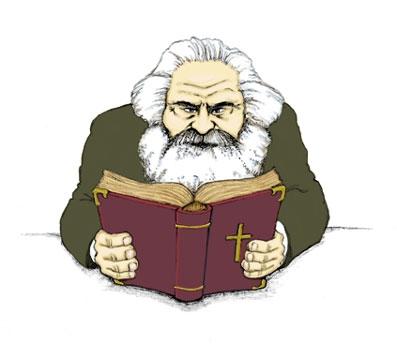Submitted by ICConline on
Day of study, London June 2012
Aim of the discussion
The day of study decided to take up the question of Islam because it is an important issue in today’s world. On the one hand it is presented as the bogey man threatening to destroy civilisation, political Islam has become synonymous with terrorism and oppression, but on the other hand it is a source of inspiration for a huge proportion of the world’s population.
In order to get to grips with what Islam represents today, the discussion looked at its origins and the role it has played in history (specifically its contribution to the Renaissance), situating it within the context of the social significance of religion generally. These are enormous questions that merit time and reflection and the day of study could obviously do no more than make a beginning by providing a basis and raising relevant questions to be developed in subsequent discussions.
Questions raised
There was general agreement among those who spoke that religion cannot provide a solution to today’s social problems but the question was raised as to whether or not Islam arose initially as a revolutionary movement. Various hypotheses were put forward as to the historical situation and the factors that gave rise to it; these points could not be adequately dealt with at the day of study and are well worth deepening in future debates. Supporting the idea that it did in fact begin as a revolutionary movement, it was stated that, even though it did not have a position against trade, money or class (as early Christianity did), it too began as a movement of the oppressed classes against their oppression but that the revolutionary message was watered down from very early on in its history – from the Roman period in fact.
Another question raised was the significance of the historical development from a mystical, religious view of the world to the attempt to interpret it scientifically.
Certain interventions insisted on the importance of the scientific method and the social significance of the Enlightenment as an important step forward, saying that one of the benefits of capitalism was the overcoming of religious superstition through rationalism and that Marxism is able to take this evolution even further.
Other interventions warned of the danger of deifying science, noting that rationalism begins with capitalism and expresses the bourgeois world view and that there are aspects of previous societies that it rejects out of hand, unable to integrate their knowledge into its own vision; aspects such as the celebration of society and its cohesion through shared beliefs and religious rites, the practice of linking up with the whole of humanity by means of meditation techniques (the ‘species being’ that Marx talks about in the Economic and Philosophical Manuscripts).
In response to this, the point was made that the going beyond the individual self towards the development of a true, shared humanity cannot be achieved individually; it can only be undertaken collectively by means of a social movement and that the religious framework creates a false, idealist consciousness. The search for our ‘species being’, a sense of unity with the rest of humanity, against the moral and emotional barrenness of society today, is very valid but to seek it through any form of religion is to look in the wrong place. The religious world view externalises our shared humanity, calls it god and worships it, we are alienated from it. To the working class’ need to reflect, question and discuss, it opposes the injunction to ‘have faith’; to the need for a real human morality, it opposes blind obedience to a higher power. As such, religious authority today is a means of social control and oppression, it aims to act as a brake on the development of proletarian consciousness, which needs free and open discussion and a fearless analysis of the society in which we live.
Another question raised was on how to address Islamic workers.
One suggestion was that we point out the revolutionary origins of religion and the prophetic tradition, that we show that the working class and its revolution are heir to the early religious movements (Islam, Christianity) and are able to realise their aspirations for a society free of oppression.
Many who spoke said that we do not in fact speak to Islamic workers as such, we address workers as a whole; our message is the same whether they are Christian, Muslim, non-believers. First of all we have to discuss what unites us – the fact that we are all exploited and have to defend ourselves against the attacks and how to do so. Religious belief, on the other hand, tends to be divisive; it unites ‘us of the true faith’ against all the rest, who are unrighteous: discussion about it often gives rise to tensions and defensiveness because it is felt as key to the individual’s sense of worth and security. An open discussion involving the whole of the working class on the nature of religion will be possible only late in the revolutionary development of consciousness when the class has sufficient confidence in itself as a class to confront such differences openly and frankly.
Conclusion
A discussion that stimulated a great deal of interest and reflection. It is important to pursue it.
VJ







 del.icio.us
del.icio.us Digg
Digg Newskicks
Newskicks Ping This!
Ping This! Favorite on Technorati
Favorite on Technorati Blinklist
Blinklist Furl
Furl Mister Wong
Mister Wong Mixx
Mixx Newsvine
Newsvine StumbleUpon
StumbleUpon Viadeo
Viadeo Icerocket
Icerocket Yahoo
Yahoo identi.ca
identi.ca Google+
Google+ Reddit
Reddit SlashDot
SlashDot Twitter
Twitter Box
Box Diigo
Diigo Facebook
Facebook Google
Google LinkedIn
LinkedIn MySpace
MySpace